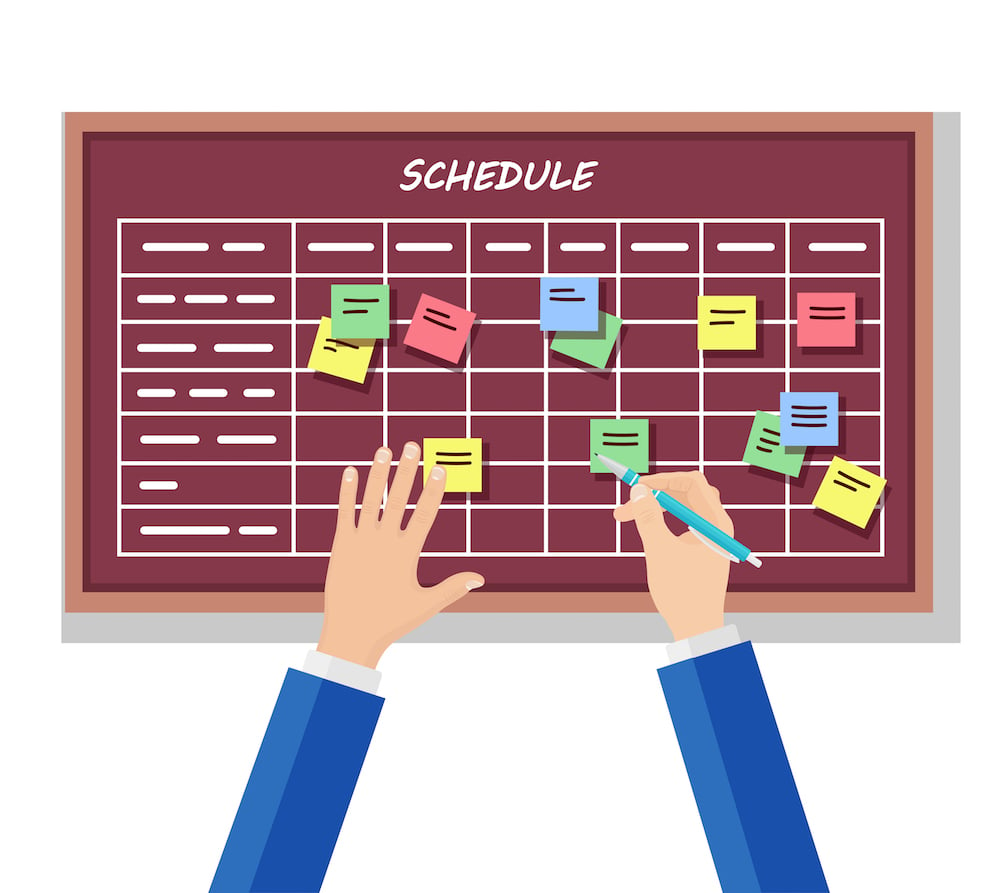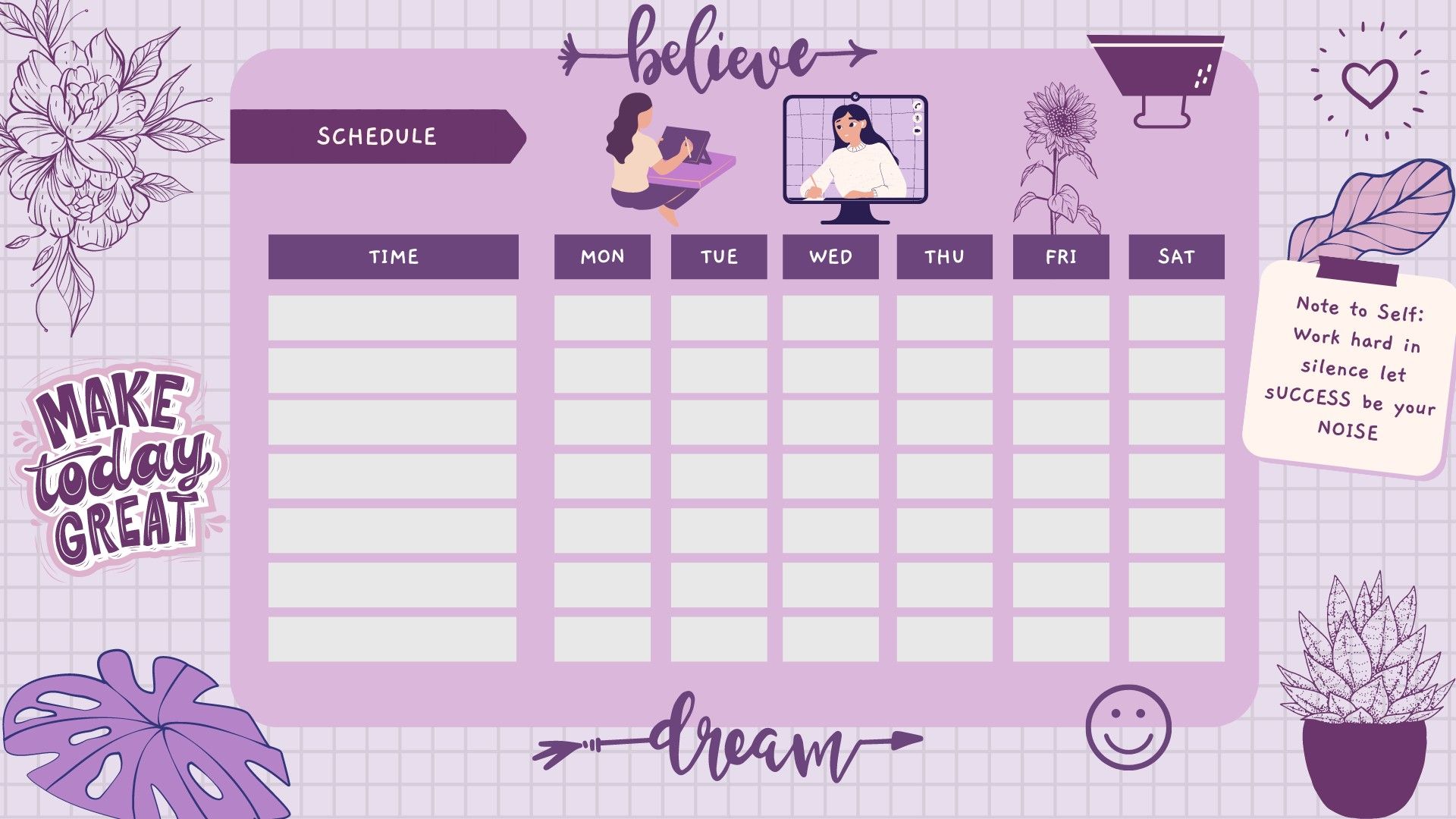
Whether you’re a student, a stay-at-home parent or a salaryman, we all can appreciate the use of a good schedule. Essential for keeping us on task and our days organised, a well-maintained schedule is an important tool to keep in your quiver so you can make the most of your workday.
If you’re a student, scheduling your day or week is important to keep track of upcoming tests or assignments. A daily schedule can help you be informed of the classes you have on that day, as well as keeping track of whatever extracurricular activities or homework you have been assigned. Not only that, developing the skill of good scheduling early on trains your skill of time management, which is very important in the workplace.
For the stay-at-home parent, a good schedule keeps you up to task for whatever household chores might need to be completed on a certain day. Keeping your children’s and spouse’s itineraries in your schedule can keep you updated on important dates, like tuition classes, extracurriculars or even medical appointments.
As a salaryman, scheduling your meetings and appointments can keep you organised, so you never get caught off guard with a meeting you didn’t account for. Having a well-managed schedule not only allows you to keep in mind important due dates but also keeps your free time available at a glance so that you can find time for your leisure and family time.
There are no downsides to keeping a well-maintained schedule to organise your time and your priorities. If you are looking to make a change and build the perfect schedule for your needs, we have compiled a list of helpful tips to streamline your schedule-building process.
Prioritize Tasks:
For those of us with a very busy schedule, a large number of pending tasks might be too overwhelming. Instead of being motivated to complete our workload, being overwhelmed by the sheer number of tasks might not work in our favour, leading to task paralysis.

To overcome this challenge, it might serve you better to identify and prioritise tasks based on their importance and deadlines. That way, you can easily identify what is the most urgent and pressing task, and complete that first.
Tasks that do not have a time crunch can be completed later on in the day or week, depending on your availability on the day.
If you’re looking to classify your tasks further, you can look into something called the Eisenhower Matrix.
It is not as complex as it sounds! The matrix simply divides your tasks into four quadrants,
Urgent and important
Important but not urgent
Urgent but not important
Neither urgent nor important
For example, a task that is urgent and important could be a home work assignment due tomorrow. Something important but not urgent could be making revision notes for a chapter that was just covered over the week. Urgent but not important could be picking up a refill of milk.
Lastly, something neither urgent nor important could be a simple errand, like dropping off old clothes at the second-hand store.
Time Blocking:
If you are working on your daily schedule, something that you could consider implementing is time-blocking.
How it works is by allocating specific blocks of time throughout your day for different activities. This works especially well if you don’t have an assigned timetable, where specific hours are assigned for certain classes or activities.
Time-blocking ensures that you are only working on one task at any given time. This helps in maintaining focus and prevents multitasking, which can lead to decreased productivity.
For example, if you are self-employed and looking to build your daily schedule, breaking down your routine into blocks of time can keep you organised without running the risk of being too rigid.
Set aside some time for your morning routine, followed by your first stint of work, your lunch break and so on.
Labelling what work you need to complete during each work block with prioritised tasks will help you even more when building an efficient schedule.
Include dedicated time blocks for tasks such as meetings, deep work, breaks, and personal activities. Be realistic about the time needed for each task to avoid overloading your schedule.
Batch Similar Tasks:
When deciding how to organise your work blocks, try to accomplish tasks of the same genre together. If you want to start your day by answering emails, why not group these tasks with catching up on work texts as well as phone calls?
Grouping similar tasks together to take advantage of efficiency and reduce context switching. That way, by the time you move on to the next task, you will not have to constantly be distracted by switching gears. If you are working on a task batch that does not require screen time, consider putting away your screen or using apps to make sure you remain undistracted.
Let me give you an example. By grouping your communication-related tasks together, it will be less distracting and more streamlined. As opposed to breaking up your communication streak with a different task, like filing a report in between phone calls.
Batching tasks allows your brain to stay in a particular mode, leading to increased productivity and reduced mental fatigue.
Set Realistic Goals:
While planning your schedule, it is important to be mindful of what you can complete realistically in a day by setting realistic goals. Overpacking your schedule your schedule can lead to excess stress and even task paralysis.
This is when you feel so overwhelmed with the number of tasks that you have to complete, that you find it challenging to even begin. This can lead to a vicious cycle, where the number of things you have to do keeps piling up, causing you to feel more ad more overwhelmed.
If you have no choice but to endure a particularly busy period, but you still don’t want to overstress yourself, try this instead.
Break down larger tasks into smaller, more manageable steps, and set achievable goals for each day. This approach not only enhances productivity but also provides a sense of accomplishment.
For example, if you are faced with a huge presentation due at the end of the week, instead of trying to complete everything in the shortest amount of time, divide your workload over the week.
This helps you avoid pushing the large task to the last minute. Try to maybe schedule your research time to the beginning of the week, and divide the number of slides you have to complete over a few days.
With this method, a large task can seem less overwhelming. You also have more time to work on other activities throughout the week. Spreading out large tasks over many days allows you to take your time with a large and detailed project, allowing you to pay more attention to detail and be more prepared.

Include Buffer Time:
Last but not least, try to account for some buffer time in your schedule. This allows you to plan for unexpected interruptions or delays. We cannot predict if something urgent might crop up out of nowhere, so having some wiggle room between events can help give you some peace of mind.
That way, if something unforeseen happens, the extra time helps in avoiding a domino effect where one delay impacts the rest of your day.
Reserve some time between meetings or tasks to address unforeseen issues, respond to urgent emails, or simply take a short break to recharge.

Remember to regularly evaluate and adjust your schedule based on your experiences and evolving priorities. Flexibility is essential for adapting to changing circumstances and maintaining a schedule that works best for you.
